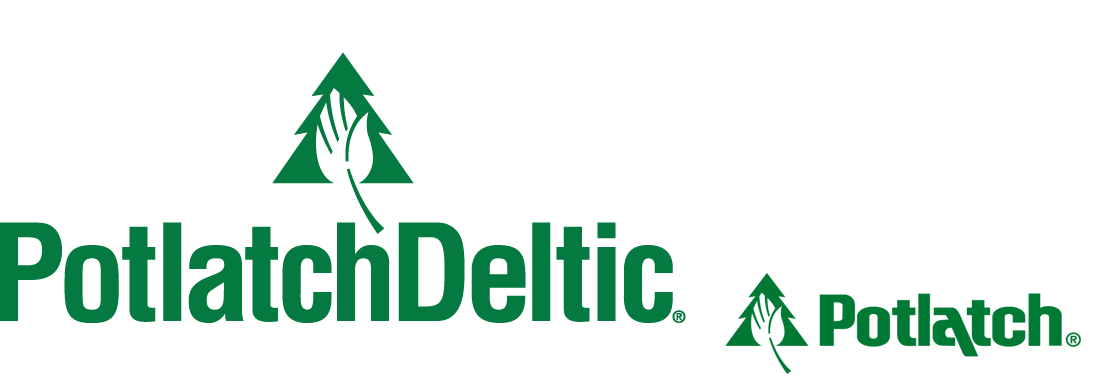Climate Initiatives
Part of the Solution to Climate Change
Our forests can support climate solution initiatives and advance the UN Sustainable Development Goals. Opportunities are considered in our strategic and operating plans and in our advocacy and policy initiatives. These factors can impact our business, strategy, and financial planning.
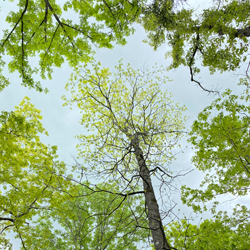
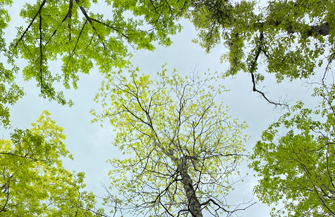
MAXIMIZING THE VALUES OF WORKING FORESTS
Sustainably managed working forests can play a significant role in providing solutions to climate change and can provide other environmental benefits such as clean water and biodiversity. Our forests can participate in net-zero strategies through Improved Forest Management (IFM) carbon projects in voluntary markets which generate high-quality and high-integrity durable climate benefits. Solar leases or real estate sales on our lands can support the renewable clean energy transition. Residuals from manufacturing wood products and lower-value trees can be used as feedstock in bioenergy facilities to produce sustainable aviation fuel or other renewable energy alternatives. Some of our lands provide opportunities to reduce atmospheric carbon dioxide through the development of geological carbon capture and sequestration through our subsurface pore space ownership rights. Building with wood and mass timber stores carbon for the long-term. Other emerging technologies which utilize wood fiber for bioplastics could offer transformative solutions towards a bio-based circular carbon economy.
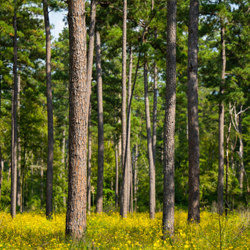
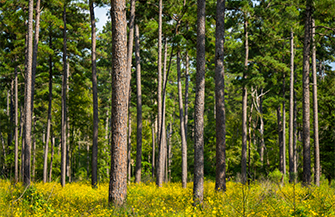
MORO BIG PINE CARBON OFFSET PROJECT
The Moro Big Pine Natural Area-Wildlife Management Area (Moro Big Pine) is located in Calhoun County in South Central Arkansas. It is an approximately 16,000-acre conservation easement that exemplifies PotlatchDeltic’s commitment to the storage of carbon in forests, advanced habitat development for the endangered red-cockaded woodpecker (RCW), and the implementation of long-term sustainable timber management practices. Moro Big Pine is situated in the West Gulf Coastal Plain and features flat topography within the Lower Ouachita River Basin. In addition, this area provides atmospheric carbon removal and storage in standing timber and harvested wood products, playing a role in climate mitigation. In 2006, PotlatchDeltic developed a forest carbon project at Moro Big Pine to generate carbon offset credits by maintaining and increasing additional forest carbon stock. This area features 25% planted native stands that are managed alongside natural non-planted forests of varying age classes, including uneven-aged and two-aged systems. The forest is recognized for its rare and valuable habitats that are important to several species, including the RCW. This area was established as a “working forest conservation easement” in 2006 and allows PotlatchDeltic to manage the forest for timber production while also providing high quality RCW habitat.
Co-Benefits
Biodiversity: Red-Cockaded Woodpecker, White-tailed Deer, Eastern Wild Turkey, Bobcat, Northern Bobwhite Quail, Gray Squirrel, Eastern Box Turtle, various bat species, many pollinators (including butterfly and bee species), natural pine stand management, extended plantation rotation lengths and bottomland hardwoods management.
Water Resources: Dry Branch-Champagnolle Creek, Crooked Creek-Ouachita River, and Outlet Lloyd Creek watersheds within the Lower Ouachita River Basin.
Community: Open to the public for a range of recreational activities, providing nature enthusiasts and local communities with opportunities to enjoy and explore.
VIDEO:
Moro Big Pine
Project History
PotlatchDeltic is committed to balancing economic viability and responsible environmental stewardship. In 1995, PotlatchDeltic entered into an historic partnership with the U.S. Fish and Wildlife Service to create a habitat conservation plan (HCP) for the RCW, providing a variety of strategies for encouraging the bird’s recovery. The RCW was listed as an endangered species in 1970. Across its range, the total population had dropped to an estimated 15,000 from an original population of 1.5 million, but has since shown recovery. PotlatchDeltic has recognized the need for continued support for this species and has implemented a plan to promote the preservation and management of RCW habitat in Moro Big Pine. After the 2018 merger with Deltic Timber Corporation, a small number of RCWs scattered in non-viable demographic locations on the acquired lands were relocated to Moro Big Pine to help enhance the population’s size and genetic diversity.
Almost twenty years of habitat management and the translocation of RCWs to improve population viability has led to the successful growth of the Moro Big Pine RCW populations. The RCW population on Moro Big Pine is now large enough that PotlatchDeltic is working in partnership with the Arkansas Natural Heritage Commission to translocate sub-adults from Moro Big Pine to other small RCW populations in Arkansas to increase their genetic diversity. By managing forests with longer timber rotations and utilizing both even-aged and uneven-aged systems, we promote the sustainable supply of timber, while also preserving the ecological integrity of the forest and enhancing the area’s biodiversity. PotlatchDeltic’s inclusion of a forest carbon project demonstrates our commitment to combating climate change through significant carbon removals and storage. PotlatchDeltic’s comprehensive approach emphasizes our vision of fostering a healthy, resilient forest ecosystem that benefits both the environment and future generations.
View California 1305 Disclosure for the Project Here >>



